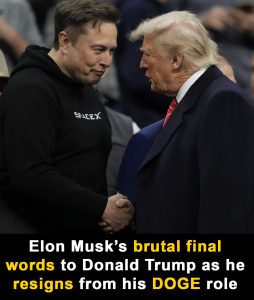Elon Musk has officially announced his early departure from a short-lived role within the Trump administration, voicing strong disappointment over the president’s latest fiscal policy decisions. Musk, the high-profile CEO of Tesla and SpaceX, had taken on a temporary government role as a Special Government Employee (SGE), a designation that allows individuals to serve up to 130 working days per year. His scheduled exit was originally planned for May 28, but he stepped down three days early, in what many see as a direct response to the controversial federal budget legislation that President Trump recently promoted.

Speaking in a CBS interview that aired on May 27, Musk didn’t hold back his criticism of the administration’s new spending bill. “I was disappointed to see the massive spending bill,” he said. “Frankly, it increases the budget deficit, not decreases it, and undermines the work that the DOGE team is doing.” He went on to add, “I think a bill can be big or it can be beautiful… but I don’t know if it can be both.” These remarks quickly gained traction, and according to reports from the BBC, Musk’s blunt commentary led the White House to accelerate the process of ending his government service.
Taking to his platform, X, Musk confirmed the early departure, posting a farewell message that thanked the president for the opportunity while reaffirming his commitment to the mission of DOGE—the Department of Government Efficiency. “As my scheduled time as a Special Government Employee comes to an end, I’d like to thank President @realDonaldTrump for the opportunity to reduce wasteful spending. The @DOGE mission will only grow stronger as it becomes a way of life across government,” he wrote.
While President Trump has yet to respond directly to Musk’s departure or criticism, he did post a cryptic meme on Truth Social showing himself walking alone down a darkened street with a bold caption: “He’s on a mission from God & nothing can stop what is coming.” The vague message has led to speculation that tensions between Trump and Musk may be deeper than they appear on the surface.
Musk’s role was not an elected position, but he had a central part in the DOGE department, which he co-led with entrepreneur and former Republican presidential candidate Vivek Ramaswamy. Together, they had been tasked with an ambitious plan to overhaul how the federal government manages spending. Their strategy involved reducing bureaucracy, eliminating what they deemed as non-essential departments and programs, and executing cost-cutting measures on a national scale. Among the most controversial proposals were the dismantling of Diversity, Equity, and Inclusion (DEI) initiatives, large-scale workforce reductions, and steep funding cuts to the Department of Education.
One of Musk’s key goals was to completely shut down the DOGE department by July 4, 2026, aligning the department’s end with America’s Independence Day as a symbolic gesture of returning fiscal control to the people. Musk frequently referenced this date in his public remarks, positioning it as a milestone for achieving government accountability and efficiency. His supporters viewed the plan as a bold vision for a leaner federal government, while critics accused it of being overly radical and dismissive of essential public services.
At the center of the controversy that ultimately led to Musk’s resignation is the bill commonly referred to by the administration as the “Big, Beautiful Bill.” This sweeping piece of legislation includes a staggering expansion of defense spending, tax incentives estimated in the trillions of dollars, and funds allocated for Trump’s much-discussed “Golden Dome” missile defense system. Although the bill passed through the House of Representatives by a slim margin, it still faces considerable scrutiny and must clear the Senate before it becomes law.
Critics argue the bill is fiscally irresponsible and flies in the face of the very principles Musk and the DOGE team were brought in to support. The Congressional Budget Office has projected that the bill could add as much as \$600 billion to government spending in the upcoming fiscal year alone. That projection has been echoed by several fiscal watchdog groups and even some within the Republican Party who are wary of adding to the national debt. For Musk, this trajectory was evidently incompatible with his vision for a responsible and restrained federal budget.
Though his government service was never intended to be permanent, Musk’s abrupt departure has sparked widespread attention not only because of his status as a business icon but also because of the unusually public nature of his critique. The rift between Musk and Trump now represents a broader ideological divide within the GOP: one between traditional fiscal conservatives advocating for smaller government and those more focused on aggressive national spending and large-scale defense initiatives.
Musk’s time in Washington, albeit brief, has highlighted the challenges of implementing sweeping reforms within a complex political system. His approach—technocratic, data-driven, and unapologetically disruptive—stood in stark contrast to the often politically calculated decisions coming from within the administration. While some admired his candor and results-oriented mindset, others found his style abrasive and lacking political tact.
Ultimately, Musk’s early resignation from DOGE signals more than just a personal disagreement with a specific policy. It underscores the difficulty of aligning corporate efficiency models with governmental structures entrenched in politics, compromise, and competing interests. Whether Musk’s departure will have lasting implications for the future of fiscal reform in government remains to be seen. However, his statements and actions have reignited a national conversation about budget discipline, the role of tech leaders in shaping policy, and the limits of public-private partnerships in achieving meaningful reform.
As Musk returns his full attention to Tesla, SpaceX, and his other ventures, the future of DOGE remains uncertain. Without his high-profile leadership, some question whether the department will retain the momentum it had initially gained. Meanwhile, political analysts continue to monitor how this split with Trump may influence upcoming elections and shape the public’s perception of both figures. One thing is certain: Musk’s exit from politics has made just as much noise as his entrance, and the ripple effects are far from over.





